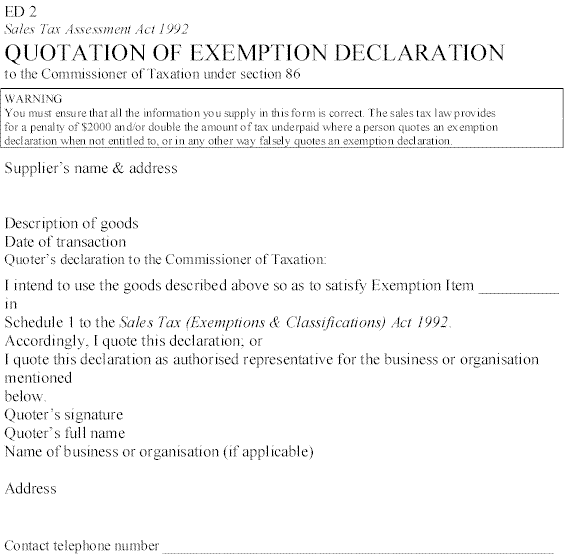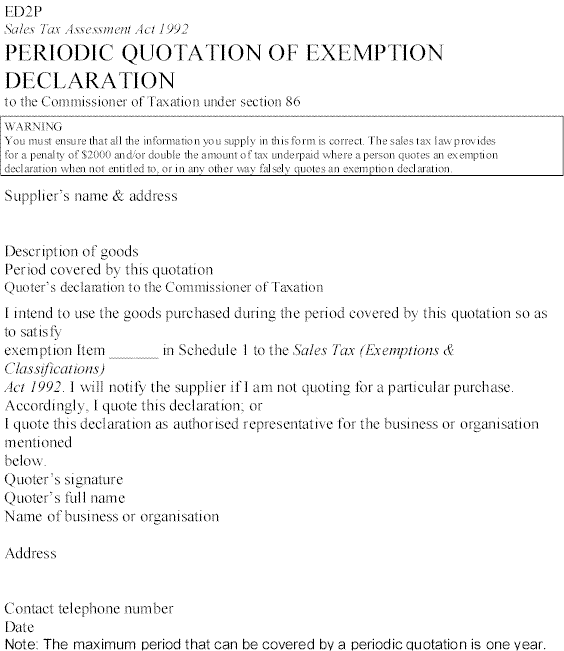Sales Tax Bulletin - No. 20
STB 20
Exemptions for Child Care Bodies-
This document has been Withdrawn.View the Withdrawal notice for this document.
Date of Issue: 1 October 1997
Valid from 1 October 1997
| Produced by the Withholding & Indirect Taxes Program of the Australian Taxation Office. |
Replaces Sales Tax Bulletin No. 20 - Exemptions for child care bodies issued on 1 October 1995
About this bulletin
This bulletin explains the sales tax exemptions available on goods used by child care bodies in providing child care. It is a public ruling for the purposes of section 77 of the Sales Tax Assessment Act 1992 and may be relied upon by any person to whom it applies. It replaces any previous private or public rulings, if they are inconsistent with this bulletin, and is current as at 1 October 1997.
Warning: We regularly revise our publications to take into account changes in the law so if you are seeking to rely on anything contained in this bulletin, you should make sure that this edition is the latest.
If, after reading this bulletin, you need more information on how the sales tax law affects child care bodies, contact the Tax Office on 13 28 66 for the cost of a local call.
Which child care bodies qualify for exemption?
Only exempt child care bodies will be able to claim exemption. They are:
- • bodies whose principal function is to provide one or more of the following types of child care:
- • family day care co-ordination units:
What does government funding mean?
The Commonwealth Government and the State and Territory Governments provide funding to assist with, or support, the child care services described above. Child care bodies are eligible for funding if an agreement is signed and continues to exist between them and the government body that is providing the funding.
A child care body qualifies for exemption if it is eligible to receive Child Care Assistance (fee relief), operational assistance or establishment or capital grants from the Commonwealth Government or from a State or Territory Government.
What about private and profit making child care bodies?
Private and profit making child care bodies can qualify for exemption if they're eligible to receive government funding.
What about employer sponsored child care bodies?
Exemption isn't available to child care bodies where the care is provided principally for children of employees or children of the employer.
Which goods can child care bodies buy free of sales tax?
Exempt child care bodies can buy goods free of sales tax which are used mainly (ie. more than 50%) in providing one or more of the kinds of child care listed on page 1. For example, a body responsible for a long day care centre, which also provides family support services, will not be able to claim exemption on goods used mainly in providing the family support service.
Family day care coordinating units can only claim exemption on goods used mainly in organising, supporting and monitoring the provision of family day care. This includes equipment (e.g. starter kits, toys, etc.) supplied to the individual carers and returned to the co-ordination unit when the carer no longer performs that function.
What about goods bought by family day care givers?
Goods bought by individual carers for use in providing care in their homes are not exempt.
What types of goods can you buy free of sales tax?
Goods bought by child care bodies will fall into two categories:
1. Goods that are always exempt from sales tax
These goods include certain foodstuffs, milk, baby nappies, nappy liners, prams, strollers, pushers, basinets, sleeping baskets, cradles, cots, baby capsules, safety seats, booster seats and restraining harnesses for infants.
Your supplier shouldn't charge you sales tax when you buy these goods. These goods are exempt no matter who uses them.
2. Goods that are subject to sales tax
Your supplier will charge you sales tax on taxable goods unless you can claim exemption by giving the supplier an appropriate exemption declaration (see How do I claim exemption on taxable goods? on page 4).
These goods include toys, puzzles, paper, craft supplies, tables, chairs, playground equipment, office equipment (e.g. computers, facsimile machines and furniture), stationery, television sets, video recorders, toilet and cleaning materials, taxable beverages and foodstuffs (e.g. chocolate milk, orange juice and snack foods).
You can only claim exemption on these goods if you are going to use them for at least two years or the normal working life of the goods if that's less than two years. This does not apply, of course, to consumable goods.
What about motor vehicles?
Motor vehicles qualify for exemption only when they're used mainly by the exempt child care body in providing child care. Activities accepted as providing child care include:
- • picking up children and transporting them to various locations;
- • buying goods used in child care and transporting them to the centre;
- • visiting children placed with care givers;
- • banking fees associated with child care; and
- • where several child care centres are operated by one proprietor, travelling between the centres for the purposes of collecting child care fees, supervising, interviewing and training of staff etc.
A motor vehicle that is used mainly for private purposes, e.g. travelling between a person's home and the child care centre, would not qualify for exemption.
The main use of a motor vehicle is normally worked out on a mileage basis.
Some luxury vehicles, however, will still be totally exempt when used mainly in providing child care. These are vehicles which are specially equipped to carry disabled people in wheelchairs and which are not covered by sub-item (1) of either Item 96 or 97 in Schedule 1 to the Sales Tax (Exemptions and Classifications) Act 1992. Items 96 and 97 apply to motor vehicles for certain disabled people. For more information contact your local Tax Office on 13 28 66.
How do I claim exemption on taxable goods?
You claim exemption by giving your supplier a written exemption declaration. A blank copy of the form is on page 6. You can photocopy the blank form and use one each time you buy taxable goods. If you prefer, you can have the following wording printed onto your official order form:
|
To the Commissioner of Taxation, The goods described on this order are intended to be used so as to satisfy exemption Item 144A in Schedule 1 to the Sales Tax (Exemptions and Classifications) Act 1992. Accordingly I quote this declaration as authorised representative of the child care body. Quoter's signature Quoter's full name |
Alternatively, you can now give your suppliers a single quotation to cover all your tax free purchases in a period, where that period does not exceed one year. A blank copy of the form is shown on page 7.
The supplier will keep the exemption declaration as evidence supporting the sale of goods tax free. Tax free sales made by suppliers are regularly checked by the Tax Office.
What if I claim exemption incorrectly?
If you claim exemption when you're not entitled to, you'll have to pay the sales tax on the goods. The sales tax law also provides for a penalty of $2 000 and/or double the amount of tax underpaid where you quote an exemption declaration when not entitled to, or in any other way falsely quote an exemption declaration.
Who can sign the exemption declaration?
Only authorised officers of the child care body should sign exemption declarations. You should keep proper controls to ensure that you only claim exemption to which you are entitled. You should also keep the blank exemption declarations in a safe place.
What if I order goods over the phone?
The Tax Office has approved a two-stage quoting process when goods are ordered and exemption is claimed over the phone. This process consists firstly of an oral reference to the exemption Item number when ordering the goods, followed up by the written quotation within a reasonable time.
In practice, this will allow a buyer to quote over the phone, and provide the signed written quotation when paying the account.
What if I order goods by facsimile?
This is acceptable so long as you provide the full form of quotation as shown on pages 6 or 7 or, if you are faxing pre-printed official order forms incorporating exemption declarations, the quotation in the form mentioned on page 4.
Can I get a refund if I forget to claim exemption?
Yes. If you are an exempt child care body and have borne sales tax on any goods you use mainly to provide child care, you can claim a refund from the Tax Office of the tax you have borne provided:
- • the total refund claim is for $200 or more (you can add smaller amounts together to reach $200);
- • the claim is made within three years of the date of purchase; and
- • the goods were not purchased before 17 December 1995.
Can I get a refund for goods I bought before I became an exempt child care body?
Yes. You can claim a refund from the Tax Office of the sales tax you have borne if you satisfy all the following conditions:
- • you became an exempt child care body within 3 months after you first began to provide child care services (an exempt child care body is one that is eligible to receive Commonwealth, State or Territory child care funding, or is approved by the Minister for Family Services);
- • you bore sales tax on goods you bought after 23 December 1993;
- • you bought the goods no more than 12 months before you became an exempt child care body; and
- • you would have been able to quote an exemption declaration when you bought the goods had you been an exempt child care body.
The above refund provisions only apply to exempt child care bodies whose main function is providing either long day care, outside school hours care, vacation care and/or occasional care. It does not extend to family day care co-ordination units.
The total refund claim must be for $200 or more although you can add smaller amounts together to reach $200.
Do you need more information?
If you have any questions or need more information about how sales tax applies to you, please contact your local Tax Office:


ATO references:
NO NAT 2170.10.97
Copyright notice
© Australian Taxation Office for the Commonwealth of Australia
You are free to copy, adapt, modify, transmit and distribute material on this website as you wish (but not in any way that suggests the ATO or the Commonwealth endorses you or any of your services or products).
